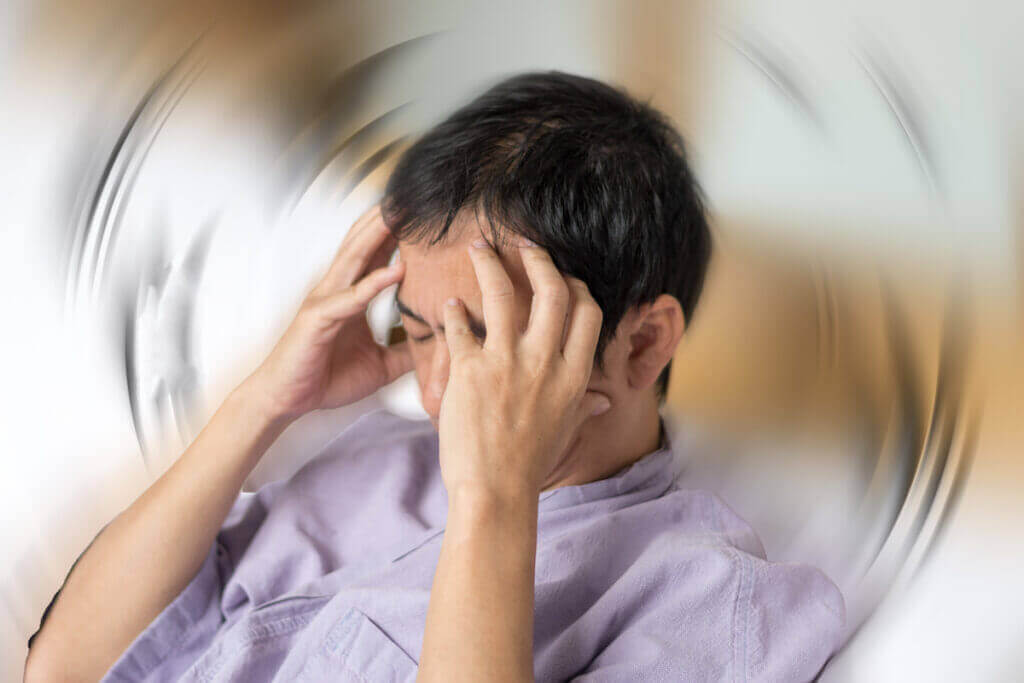Migraine Associated Vertigo-various aspects-
Vestibular migraine is another name for migraine-related vertigo, which is when a person has vertigo (a feeling of spinning or imbalance) either with or without the common migraine headache. It might be difficult to diagnose this kind of migraine since the vestibular symptoms may manifest even when there is no headache.


Important characteristics of vertigo associated with migraine:
Description:
Vertigo linked to migraine is a type of migraine in which vertigo is a major symptom, which may or may not be accompanied by a headache.
Symptoms:
In addition to vertigo, patients may have nausea, vomiting, imbalance, light or sound sensitivity, visual auras, and visual abnormalities.
Duration:
The associated symptoms of vertigo episodes might range in severity, and the attacks can last for minutes to days.
Diagnosis:
The diagnosis process includes a comprehensive history, which may include ruling out other vestibular diseases and a thorough evaluation of vestibular function.
Treatment:
Lifestyle adjustments, medicines to control migraine symptoms, and vestibular rehabilitation exercises are all possible treatments.
If Any Patient of ENT Requires Any Surgery, Opd Consultation Or Online Consultation In Clinic of ENT Specialist Doctor Dr. Sagar Rajkuwar ,He May Contact Him At The Following Address-
Prabha ENT Clinic, Plot no 345,Saigram Colony, Opposite Indoline Furniture Ambad Link Road ,Ambad ,1 km From Pathardi Phata Nashik ,422010 ,Maharashtra, India-Dr. Sagar Rajkuwar (MS-ENT), Cell No- 7387590194, 9892596635
Overview
Migraine-related vertigo can present in a number of ways, including lightheadedness, episodic true vertigo, positional vertigo, ongoing imbalance, and/or movement-related dysequilibrium.
During a headache, before the headache begins, or, as is more usual, in between headaches, symptoms may appear. As a result, many migraine sufferers have vertigo or dizziness as their primary symptom rather than headache. Because of this, this paper focuses on describing vertigo associated with migraine.
The clinical link between migraine and vertigo has been mentioned often since the nineteenth century. Numerous episodic vertigo syndromes linked to migraine have been documented throughout the years, such as benign paroxysmal vertigo of childhood and benign recurrent vertigo in adults. Additionally, some writers have hypothesized a connection between migraine and Ménière disease.


It is now understood that vestibular migraine frequently manifests as vertigo brought on by migraine. Teggi et al. found that 244 patients with vestibular migraine might be categorized into five distinct clusters based on the condition’s features.
- Cluster 1: Extended vertigo episodes
- Cluster 2: Vertigo with cochlear symptoms and no migraine headache
- Cluster 3: Vertigo accompanied by cochlear symptoms but no headache
- Cluster 4: vertigo accompanied by a migraine headache and cochlear symptoms
- Cluster 5: Vertigo occurs along with migraine headaches, but not with cochlear symptoms.
Basilar migraine, a form of migraine now known more formally as migraine with brainstem aura, also causes vertigo.
The lifetime prevalence of migraine was higher in the group of 200 patients who experienced vertigo (38%) compared to a comparable group of patients from the control group from an orthopedic clinic (24%) in a well-controlled trial that assessed patients from a migraine clinic, a dizziness clinic, and a control group from an orthopedic clinic. Studies comparing migraine patients have produced similar results. All forms of migraine can be associated with vertigo, as well as persistent, unexplained signs of vestibular system malfunction.
For Update On Further Important Health Related Topics And Frequently Asked Questions On Health Topics By General Population Please Click On The Link Given Below To Join Our WhatsApp Group –
https://chat.whatsapp.com/Lv3NbcguOBS5ow6X9DpMMA
According to a study by Wang et al, individuals with migraine-related vertigo have more cognitive impairment than people with basic migraine. Magnetic resonance imaging (MRI) revealed a higher rate of deep brain, peripheral lateral ventricle, and total white matter lesions in the migraine-associated vertigo group compared to the other, while cognitive tests showed that people with migraine-associated vertigo performed worse than those with simple migraine.
Vertigo and migraine definitions
Migraine headaches are frequent headaches that are typically accompanied by nausea and light sensitivity and that are spaced out by symptom-free periods. Headaches are often throbbing, subside after sleep, and may be accompanied by vertigo, dizziness, or visual symptoms. Frequently, there is a family history of migraine in the patient.
There are two types of migraine: migraine without aura (common migraine, 90% of migraine headache cases) and migraine with aura (classic migraine, 10% of cases).
The sensation of vertigo is an illusion of movement of the surroundings or of the patient in connection to the environment.
How do you treat migraine vertigo?
The treatment for migraine-related vertigo, also known as vestibular migraine, involves a combination of strategies, such as lifestyle modifications, vestibular rehabilitation exercises, and medicines to treat current symptoms and prevent future ones. Preventive medications such beta-blockers, calcium channel blockers, and antidepressants are used to lessen the frequency and intensity of seizures, whereas acute assaults are treated with medicines such triptans and anti-nausea drugs. Exercises for vestibular rehabilitation can help you maintain your balance and lessen dizziness in between bouts.


Urgent Treatment:
Painkillers:
Pain brought on by the migraine attack can be controlled with over-the-counter pain medicines like naproxen or ibuprofen.
Triptans:
Drugs such as sumatriptan, rizatriptan, and eletriptan can aid in the treatment of migraine discomfort and other symptoms.
Drugs to prevent nausea:
Meclizine, ondansetron, prochlorperazine, and other drugs may help alleviate the nausea and vomiting that accompany vertigo.
Benzodiazepines:
Benzodiazepines such diazepam or alprazolam may be used to treat severe vertigo symptoms, but because of possible adverse effects like drowsiness, they are typically administered for a short period of time.
DISCLAIMER-Some patients go to net and directly take treatment from there which can lead to catastrophic consequences-Then- Many people ask then why to read all this text -the reason is that it helps you to understand the pathology better ,you can cooperate with treatment better ,your treating physician is already busy with his patients and he does not have sufficient time to explain you all the things right from ABCD ,so it is always better to have some knowledge of the disease /disorder you are suffering from.
Treatment for Prevention:
Beta-blockers:
Drugs like propranolol and metoprolol, which are frequently used to prevent migraines, can also aid in lowering the frequency and intensity of vestibular migraine episodes.
Calcium channel blockers:
Drugs such flunarizine are occasionally used to ward off vestibular migraine episodes.
Antidepressants:
To prevent migraines and lift mood, which can be impacted by migraine, selective serotonin reuptake inhibitors (SSRIs) and serotonin-norepinephrine reuptake inhibitors (SNRIs), such as venlafaxine and duloxetine, as well as tricyclic antidepressants like amitriptyline and nortriptyline, may be used.
Antiepileptic medications:
Other medications, such as topiramate, valproic acid, and lamotrigine, which are used to treat seizures, may also be helpful in treating vestibular migraines.
Other drugs:
ScienceDirect.com states that vestibular symptoms can be treated with acetazolamide and other drugs.
Modifications to one’s way of life:
Recognize and avoid triggers:
Maintaining a headache diary can help pinpoint possible triggers, such as specific foods, stress, shifts in sleep schedules, or weather fluctuations, and then avoiding them can help prevent migraines.
Maintain a healthy diet and engage in regular physical activity:
Maintaining a balanced diet and regular physical activity might help lower stress and enhance general health, which can have a beneficial effect on the frequency of migraines.
Control your stress:
Finding methods to control stress, such as yoga or relaxation methods, can be helpful since stress can cause migraines.
Get plenty of sleep:
Getting enough sleep can help prevent migraines since a lack of it can sometimes cause them.
Rehabilitation of the Vestibular System:
Physical activities to enhance balance and lessen dizziness:
A vestibular physiotherapist can evaluate a patient’s balance and vertigo and create a customized workout routine to enhance balance and lessen vertigo in between episodes.
Exercises for habituation:
Repeatedly executing motions that cause vertigo can help the body become accustomed to them, lessening the sensitivity to such motions.
Exercises for coordination:
Activities that enhance visual tracking and hand-eye coordination can help improve balance and coordination.
Maintaining equilibrium on uneven surfaces:
Using foam or unsteady platforms for exercise can help improve balance and stability.
Other Treatments:
Cefaly:
A headband-like instrument that transmits electrical impulses to the forehead to activate a nerve associated with migraines.
GammaCore:
A portable device that alleviates pain by utilizing noninvasive vagus nerve stimulation.
toxin from botulinum:
The frequency and intensity of migraine episodes may be lessened by injecting botulinum toxin into the muscles of the head and neck.
FOR INFORMATION IN GREAT DETAIL ON How To Get Rid Of Dizziness From Migraine PL CLICK ON THE LINK GIVEN BELOW-It is always better to view links from laptop/desktop rather than mobile phone as they may not be seen from mobile phone. ,in case of technical difficulties you need to copy paste this link in google search. In case if you are viewing this blog from mobile phone you need to click on the three dots on the right upper corner of your mobile screen and ENABLE DESKTOP VERSION.
FOR INFORMATION IN GREAT DETAIL ON Headache and Vertigo for Days PL CLICK ON THE LINK GIVEN BELOW-It is always better to view links from laptop/desktop rather than mobile phone as they may not be seen from mobile phone. ,in case of technical difficulties you need to copy paste this link in google search. In case if you are viewing this blog from mobile phone you need to click on the three dots on the right upper corner of your mobile screen and ENABLE DESKTOP VERSION.
FOR INFORMATION IN GREAT DETAIL ON Migraine With Aura Treatment PL CLICK ON THE LINK GIVEN BELOW-It is always better to view links from laptop/desktop rather than mobile phone as they may not be seen from mobile phone. ,in case of technical difficulties you need to copy paste this link in google search. In case if you are viewing this blog from mobile phone you need to click on the three dots on the right upper corner of your mobile screen and ENABLE DESKTOP VERSION.
If any patient has any ENT -Ear nose throat problems and requires any , consultation ,online consultation ,or surgery in clinic of ENT specialist Doctor Dr Sagar Rajkuwar ,he may TAKE APPOINTMENT BY CLICKING ON THE LINK GIVEN BELOW-
Clinic address of ENT SPECIALIST doctor Dr Sagar Rajkuwar-
Prabha ENT clinic, plot no 345,Saigram colony, opposite Indoline furniture Ambad link road ,Ambad ,1 km from Pathardi phata Nashik ,422010 ,Maharashtra, India-Dr Sagar Rajkuwar (MS-ENT), Cel no- 7387590194 , 9892596635




